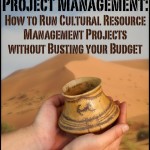 I couldn’t find a job in CRM archaeology when I first graduated with my Bachelor’s degree in Boise, Idaho. Not only did I not know where to look, I didn’t know anyone that could help me. Most of my professors had no idea where the entry-level jobs were. My grades weren’t stellar at that time and most of the anthro professors in my department suggested I look outside archaeology for employment.
I couldn’t find a job in CRM archaeology when I first graduated with my Bachelor’s degree in Boise, Idaho. Not only did I not know where to look, I didn’t know anyone that could help me. Most of my professors had no idea where the entry-level jobs were. My grades weren’t stellar at that time and most of the anthro professors in my department suggested I look outside archaeology for employment.
So, I did. I kept working for the big box retailer I’d been working at for the last two years. Off and on, I looked for archaeology jobs on the internet– even getting bold enough to apply to a couple positions and write a couple resumes in hopes of landing a job. I had no CRM experience and had only taken field school and worked on a couple weekend volunteer jobs.
Few companies were willing to offer me a position as an archaeological technician. Those that were, aside from being very desperate, made offers that, even then, I couldn’t accept. For example, a company in California said they were willing to add me to a 2-week project at about $8.00/hr with no per diem or housing allowance. I was making about $17.00/hr at my current job and was quickly advancing towards $20.00/hr. Working for half the pay while still paying bills back home in Boise was a hard pill that I just couldn’t swallow.
Fortunately, life events intervened and helped me make the leap into CRM.
One day, as I was boxing groceries, one of the few professors that saw promise in me came through my checkout line. We chatted briefly and he asked if I could help him out to the car with his purchases. I was more than willing. We kept talking as I continued to his car.
“What are you doing still working here? I thought you were going to do archaeology?” he quizzed me.
“I’ve been trying to land a job as a field tech. Nobody will hire me,” I lamented. “Besides, the pay is waaaaay lower than I make here.”
He stopped in the middle of the parking lot– his eyes laser-focused on my face. When he stopped, it surprised me. I stopped too. His gaze made me nervous and I tried to look away. In my heart, I knew what he was going to say.
“F*%k the money. I thought you were going to be an archaeologist. That’s what you told me in my office last year.” His words were curt and to the point. “Do you think we do this s*#t for the money?” He stared intently. I knew the answer, but didn’t want to say it. He paused. “Well??? You think any of us do this job for the money?”
Finally, I got the courage to look him in the eye. “I guess not,” I sheepishly replied. He kept staring. “No,” I said.
Satisfied with my answer, the old professor turned and kept walking toward his car. I followed.
“If you’re worried about money, you’d better go back to school and get a degree in another field,” he continued talking. “I got married, raised a family, and paid a mortgage all by doing archaeology. It wasn’t always easy. Sometimes I wanted to quit, but I always found some reason to go back out into the field again. And, I’ve been doing this for 40 years not because it’s my job. Archaeology is my passion. It’s who I am.”
We arrived at his truck and I started to load the groceries. My mind was racing. Here was an old mentor that I respected. He wasn’t like the other professors and I was just now beginning to realize why. I also realized that I wanted to do archaeology for the same reasons he did.
The professor kept talking. “You don’t want to look back on your life and wish you’d followed your dream, do you?” I nodded no. “Son, one of the saddest things in life is regret. Don’t worry about money. If you follow your dreams, believe me, money will come. You may not be rich, but you’ll be able to feed your family.” As he got behind the wheel of his weathered pickup, he looked at me with a compassionate face. He smiled. “You’re a young man. Follow your dreams. Don’t hesitate to call me if you want to talk some more.”
I’d love to tell you that I immediately went out and got a job in archaeology right after this conversation with that archaeology sage, but I didn’t. Even though his words were motivating, I was still wed to the fact that I could make more money as a warehouse manager than I could as a cultural resource manager. But, I can’t deny that the seeds of discontent were planted during that conversation. I always felt like my career in archaeology was slipping away as I made more money, bought more toys, and had more monthly payments. Each pay raise made me temporarily happier. I thought about buying a house and seriously looking for a spouse. In time, I even stopped looking for archaeology jobs.
However, one day, I was passed over for a promotion by someone that was late to work one less time in the last year than I was. Basically, I didn’t get a promotion because I was late to work three times in the last year. Enraged, I watched as this individual, who was older and out of shape, struggled to keep pace at a position that required regular heavy lifting. When she got injured, they asked me to take over for her. They were getting a real bargain considering I was doing her job at a much lower pay rate. I did an exemplary job in her position, but when a promotion for that same position came about 6 months later, I was passed over once again by another individual with about 3 months more seniority. Suddenly the money didn’t matter anymore.
I called my former professor. A month later, I applied to graduate school. I was accepted to two schools and quit my job about 9 months later. During grad school, I landed my first paid archaeology position.
This story has been on my mind ever since I was interviewed by Justin Dunnavant with the Society of Black Archaeologists. I was asked about how I started my career in CRM archaeology and I gave him a brief summary of how it all began. But this fateful conversation with my former professor is really how I got my start. Without the seeds planted during that talk, I would have probably kept working at the big box store or some sort of other retail establishment. Or, perhaps, I would have gone back to school for a more “useful” degree.
In the interview, I also tried to express how archaeology is a passion-driven career path. Most of the archaeologists I know have had similar inspirational experiences that caused them to pursue a career in archaeology. I’ve heard of archaeologists starting out after having eventful field experiences, hearing speeches from influential archaeologists, out of defiance from their parents, and myriad other reasons. I have also heard of archaeologists striking out in this field in order to get rich, but these folks are rare (Don’t laugh too loud. Many large CRM company founders are millionaires).
Passion for discovery and exploration is at the heart of every archaeologist’s motives. We all want to know more about human pasts. This passion drives us to doggedly pursue our trade despite the fact that we are among the worst paid scientists in modern society. There is much we can do to remedy this problem (see Doug Rocks-MacQueen’s conversation on how a guild structure can help CRM archaeology wages). At the heart of archaeology is the desire to learn. Most of us would keep learning about human history/prehistory even if we didn’t get paid for it. It’s part of our personal identities. It’s who we are. The drive to pursue that passion as a career is a major part of what separates the lifelong archaeologists from those that wash out of the industry.
Read this article on the SHA Blog to learn more about the establishment of the Society of Black Archaeologists. Hear more about the experiences of African American archaeologists on the Society of Black Archaeologists Oral History Project webpage (http://www.societyofblackarchaeologists.com/oral-history-project.html). My interview will be uploaded soon.
If you have any questions or comments, write below or send me an email.
 Small Archaeology Project Management is now on the Kindle Store. Over 300 copies were sold in the first month! Click Here and see what the buzz is all about
Small Archaeology Project Management is now on the Kindle Store. Over 300 copies were sold in the first month! Click Here and see what the buzz is all about
Learn how my résumé-writing knowledge helped four of my fellow archaeologists land cultural resources jobs in a single week!
Join the Succinct Research email list and receive additional information on the CRM and heritage conservation field.


